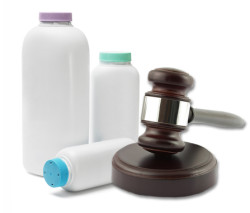Top Class Actions’s website and social media posts use affiliate links. If you make a purchase using such links, we may receive a commission, but it will not result in any additional charges to you. Please review our Affiliate Link Disclosure for more information.

In her baby powder cancer lawsuit, Karen stated that she had used Johnson & Johnson’s baby powder for years, without having any knowledge of the alleged link between this product and ovarian cancer. She filed this baby powder cancer lawsuit on Oct. 16, 2014, and is now a part of the growing number of lawsuits being filed across the United States, accusing Johnson & Johnson of negligence. Each of these baby powder cancer lawsuits allege similar injuries, in that the defendant’s talcum powder products may induce ovarian cancer in women who use these products for feminine hygiene.
From about 1980 until May 2014, Karen allegedly used Johnson & Johnson’s baby powder for feminine hygiene purposes, using the product as intended while following all label instructions for applying the baby powder onto her genital area. Karen was officially diagnosed with ovarian cancer on May 29, 2014. Her condition reportedly required immediate surgeries and treatment.
During her years of using this Johnson’s Baby Powder, the defendant made no effort to notify her or her husband of the possible side effect of ovarian cancer associated with talcum powder products, according to the baby powder lawsuit. Essentially, Karen and her husband accuse Johnson & Johnson of knowing about the risk of ovarian cancer, but failing to provide sufficient warnings on the product’s label.
The baby powder ovarian cancer lawsuit points to an old study from 1971 that focused on the alleged link between talcum powder and ovarian cancer and a subsequent follow-up study conducted in 1982. The latter baby powder study showed that women faced a 92 percent increased risk of ovarian cancer, when they applied either the defendant’s baby powder or shower-to-shower powder to their genital areas.
A more recent study in 2013 observed over 8,500 cases and 9,859 control subjects. This talc powder study found that the women who used ovarian cancer faced a 24 percent increased risk of developing ovarian cancer when compared to their non-talcum powder using counterparts. While this new research presents a significantly smaller risk than the 1982 baby powder cancer study, experts point out that both studies show a higher risk of ovarian cancer is associated with women use the talcum powder for feminine hygiene purposes.
Overall, the lawyers representing the plaintiff couple in this baby poweder cancer lawsuit state that Johnson & Johnson had the responsibility to warn consumers of the possible cancerous side effects their talc powder products carry. Karen insists that she never would have used the talcum powder product, if she had known about the risk of ovarian cancer.
For being allegedly responsible for manufacturing, selling, distributing, and marketing a dangerous product, Karen and her husband are suing Johnson & Johnson and have alleged the following charges: failure to warn, negligence, breach of warranty, and loss of consortium. The couple is seeking damages in the amount over $75,000 in compensation for pain and suffering, medical costs, and other non-economic damages.
Overview of Talcum Powder Cancer Allegations
Beginning in the 1970s, talcum powder started garnering a bit of negativity after baby powder studies showed that it could possibly induce ovarian cancer in its users. In particular, medical experts noticed that women who applied the baby powder products to their genital area for ‘feminine hygiene purposes’ faced a higher risk of ovarian cancer.
It is important to note that despite the recent studies, there is not much information available regarding the possible side effect of talc. However, scientists do agree on a central hypothesis regarding the link between ovarian cancer and talcum powder use. Medical experts explain that when the baby powder is applied to the woman’s genital area, the talc particles travel through the fallopian tubes and land in the ovaries. Then, after four to eight years, the particles fester and create ovarian cancer.
Johnson & Johnson has repeatedly denied all allegations, stating that the scientific inquires were inconclusive and that there is no actual risk. Many women disagree, resulting in the talcum powder litigation.
Do YOU have a legal claim? Fill out the form on this page now for a free, immediate, and confidential case evaluation. The attorneys who work with Top Class Actions will contact you if you qualify to let you know if an individual lawsuit or class action lawsuit is best for you. [In general, baby powder cancer lawsuits are filed individually by each plaintiff and are not class actions.] Hurry — statutes of limitations may apply.
ATTORNEY ADVERTISING
Top Class Actions is a Proud Member of the American Bar Association
LEGAL INFORMATION IS NOT LEGAL ADVICE
Top Class Actions Legal Statement
©2008 – 2024 Top Class Actions® LLC
Various Trademarks held by their respective owners
This website is not intended for viewing or usage by European Union citizens.
Get Help – It’s Free
Join a Free Baby Powder Cancer Class Action Lawsuit Investigation
If you used Johnson’s Baby Powder, Shower to Shower, or another talcum powder product and were diagnosed with ovarian cancer, you may have a legal claim. Family members of loved ones who died of ovarian cancer can also join. Submit your information now for a free case evaluation.
An attorney will contact you if you qualify to discuss the details of your potential case at no charge to you.












